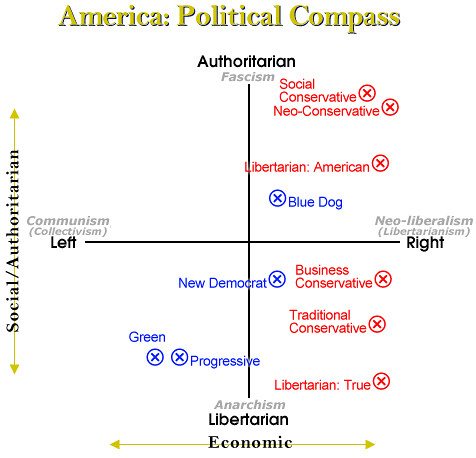The American Parliament: Our nation’s 10 political parties
 Part two in a series.
Part two in a series.
Forgive me for abstracting and oversimplifying a bit, but one might argue that American politics breaks along the following 10 lines:
- Social Conservatives
- Neocons
- Business Conservatives
- Traditional Conservatives (there’s probably a better term, but I’m thinking of old-line Western land and water rights types)
- Blue Dog Democrats
- New Democrats
- Progressives
- Libertarians: True
- Libertarians: American (Tea Party)
- Greens
There are points of overlap, obviously. In a pure parliamentary environment, these might hypothetically be ten distinct parties, or at least four or five. SocCons are defined by a fairly unitary range of religious concerns, and while they can easily make common cause with certain groups, economic issues are peripheral to their raison d’etre. Neocons and Business Conservatives (Country Club Cons) seem to overlap quite a bit and they appear to get on well with TradCons. The New Dems are functionally indistinguishable from Business Conservatives at this point in history, and the Blue Dogs might be thought of as New Dems with a healthy streak of SocCon running through them. There aren’t enough True Libertarians to shake a stick at, but the perspective is viable enough to be counted here. The American Libertarian/Tea Party is a strange brew driven by radical, race-inflected anti-tax and anti-government ideology. It has been heavily funded by BizCons, draws heavily on a bastardized understanding of the writings of Ayn Rand, and should never be confused with true Libertarianism.
Serious Progressives and Greens can be hard to tell apart – many Greens seem to be people who have given up on the utility of the Democratic party, and their official platform reads a lot like any strongly progressive mission.
If you’re familiar with the Political Compass, we might use that framework to express these positions graphically:

These ten different parties, such as they are, have to cram themselves into a two-party system, and the result usually shakes out this way:
- Republicans: Social, Business, Neo and TradCons, Libs and Tea Party
- Democrats: Blue Dogs, New Dems, Progressives and Greens
However, when it comes time to pass laws, order frequently break down. During the Bush years we saw a lot of Blue Dog and New Dem cooperation with the GOP, and under Obama we’re seeing the continued dominance of that “center/right” coalition, a practical result that frustrates progressives, especially in light of all kinds of polling showing that once you set aside labels and ask people to focus on what sorts of outcomes they believe in, the American public is far more supportive of progressive policies than is commonly understood.
The American Parliament
If we moved to a proportional parliamentary system (no, we’re not going to, not in a million years, but hypothetically) and shifted the coalition building process to the governing phase instead of the campaign/electoral phase, we might initially see the 10 hypothetical parties coalescing into a shape that looks something like this:
- Social Conservatives – significant enough numbers to go it as a distinct entity that can demand concessions on its core issues from all constituencies except the Progressives.
- NeoLiberal – the grand coalition of wealth-minded conservatives, New Dems and Blue Dogs, plus the Tea Party.
- Progressives – Progs plus Greens now have enough stroke to exert viable leverage on the legislative process.
- Libertarians – May choose to ignore social libertarianism completely and join Neos, but could decide to go it alone or to forge something with TradCons.
Over time, we might expect a shift to take place. We know some things about the American public. For instance:
- The backbone of the social reactionary segment of the population (specifically, SocCons and Tea Party) is aging and…
- the huge Millennial generation rejects race-based and anti-gay politics completely.
- The Mills are more concerned with social justice than any generation alive.
- Immigration and demographic patterns are shifting dramatically, and within a few decades whites will no longer comprise a majority of the nation’s population. The largest gains are being made by Latinos.
- The current trend toward concentration of wealth in a few hands will eventually reach an inflection point. Either policies will be enacted to disperse the wealth or, if history teaches us anything, broad economic distress will lead to a social explosion. Put simply, the trend of the last two generations toward concentration of wealth isn’t sustainable.
If these trends hold, we might expect, over the course of the next couple of decades, a distinct slide to the left. This adjustment would remove the NeoLiberal coalition’s right flank and could very well see the emergence of a new American coalition that looks and behaves a great deal like European Social Democracy. Since America is also overwhelmingly Christian, the leftward shift of religious institutions driven by the die-off of older SocCons and the Millennials’ concern for social justice might also spur the rise of an American analogue to Christian Democracy – an eventuality that would almost certainly be fueled by the increased impact of Latino voters, who are (for the time being, anyway) more progressive economically but driven by Catholic social mores.
Back to Reality
So many ifs, so many variables, and all of it predicated on an assumption of magic-wand proportional representation. As I said off the top, a thought experiment. Still, even if you set the governmental structure aside, the social, economic and political dynamics on which the preceding section is premised are very real. The rest of the world has seen similar coalitions and constituencies arise in both proportional and pluralist systems, and there’s no reason to believe that it couldn’t happen here.
The kicker, of course, is a lesson that European history teaches in painful detail: to wit, the road to a more productive democracy sometimes has to navigate hellish terrain, and there are those in the US who believe that it’s going to get really, really dark before dawn.
Perhaps. At a minimum, though, it never hurts to note where we are, to dream about where we want to go, and to plan meticulously for the journey.

Sam Smith
Samuel Smith lives a double life. Okay, triple life. By day he makes a living as a marketing consultant specializing in high-level strategy, branding, corporate communication and merging media and practices. In his "spare time" he's the executive editor of Scholars & Rogues, where he writes about everything from politics to music to sports to literature. Finally, he's an author of poetry and fiction whose work has appeared or is forthcoming in journals like storySouth, Poet & Critic, New Virginia Review, Cream City Review, High Plains Literary Review, The Dead Mule School of Southern Literature, Pemmican and Uncanny Valley. He holds a BA at Wake Forest and MA from Iowa State, and somehow endured the torturous process of earning a PhD in Communication from the University of Colorado.
3 Responses to The American Parliament: Our nation’s 10 political parties
Recent Comments
- Kucuka.net on Intellectual Property is a bad thing.
- evgeniy levchenko datums aangemeld on Debt slavery is a natural consequence of unregulated capitalism
- best career counselor on What will it take to address the climate emergency
- hyip on Debt slavery is a natural consequence of unregulated capitalism
- Tony Williams on Debt slavery is a natural consequence of unregulated capitalism
Blogroll
- 4dancers
- Aaron Krager
- Amygdala
- Autonomy for All
- Away Point
- Blue Jersey
- Bluemars
- Brad Blog
- Campaign for America's Future
- Cassandra Files
- Clear It with Sidney
- Cogitamus
- Crooks and Liars
- Cucking Stool
- Daily Show with Jon Stewart
- Dirty Hippie Sports Talk
- Disaffected and It Feels So Good
- Dispatches from the Culture Wars
- Dork with a Nerd Rising
- Eastern Sunz
- Florida Progressive Coalition
- Focal Points
- FOK News Channel
- Frederick Clarkson
- Frustrated Teacher
- Greatscat!
- HandPicked Nation
- Jazz from Hell
- jazz89 KUVO Public Radio
- Kenneth J. Bernstein
- La Bloga
- Lee Camp
- Litbrit
- Live Free or Die Alliance
- Live from the Left Coast
- MarioWire
- Media Matters
- Merge Left
- Mind Potion Radio
- MPA Political
- New York Communities for Change
- Nuclear Diner
- Political Carnival
- Progressive Leadership Action Network
- Progressive PST
- Radio or Not
- Republic Report
- Scholar as Citizen
- Scholars and Rogues
- Seeing the Forest
- Smirking Chimp
- Smoking Politics
- SomaFM
- Somos Tejanos
- Speak Out California
- Spedwybabs
- Spocko's Brain
- Stark Reports
- StarTalk
- Suburban Guerilla
- Symphony of Science
- Talk to Action
- thereisnospoon
- Today's Workplace
- Truth Vigilante
- Waking from the American Dream
- Worldwide Hippies
- WTF Is It Now?!?
- Error: Could not open handle for fopen() to http://heyhippies.tumblr.com/api/read?num=2
CALENDAR
February 2026 M T W T F S S « Apr 1 2 3 4 5 6 7 8 9 10 11 12 13 14 15 16 17 18 19 20 21 22 23 24 25 26 27 28 Category Cloud
Activism Americans Barack Obama Blogging Budget Bush II Administration Business Capitalism Class Warfare Congress Conservatives Corporatism Corruption Democracy Democrats Dirty Hippies Economy Education Elections Extremism Government Greed Health Care Jobs Journalism labor Media messaging Obama Administration Politics Progressives Religious Right Reproductive Rights Republicans Satire Social Security Taxation Tea Party Uncategorized Unions US Politics Violence Wall Street Wealth Wisconsin


Interesting point of view. I am going to be thinking about it.
I like this:
“•The Mills are more concerned with social justice than any generation alive.”
I liked reading that. What is your evidence?
A good bit of research indicates this. Howe and Strauss talk about it in Millennials Rising, and there has been more study done on things like volunteerism rates that supports the claim.
Is this a joke?
Progressives are close to anarchy? The same progressives who favor more business regulations, more taxation, more government programs, more gun control, universal health care, environmental control, diet restrictions, social justice, and on and on?